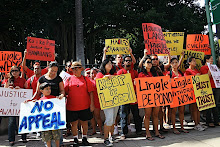The
below commentary was published in today's Honolulu Advertiser.
Resolve claims before selling ceded lands
It's a matter of simple justice and fairness for Native HawaiiansBy Derek H. Kauanoe
Five years ago, The Advertiser reported that Gov. Linda Lingle described Native Hawaiian federal recognition as being "about fairness, justice and treating all indigenous people in our country the same." Gov. Lingle was also quoted as saying that federal recognition is a "matter of simple justice" when she testified before Congress in support of the Akaka bill.
Whether the state should be selling ceded lands, lands belonging to the Hawaiian kingdom and eventually transferred to the State of Hawai'i, before reaching a settlement with Native Hawaiians, is also a matter of simple justice and fairness.
I recently explained the ceded lands situation to someone who did not quite understand the conflict between the Lingle administration's view that the state can sell ceded lands and our highest state court's landmark decision placing a moratorium on such sales.
I asked this person to imagine that the two of us were married, but the marriage did not work out. As a result, we apologized to each other for the difficulty and hurt inflicted and agreed to get a divorce. In the process of getting a divorce I began selling personal property that she brought into the marriage in addition to selling the personal property we owned together, both before we established a complete inventory of the property and before a determination was made as to who would get what. I kept the money from those sales but she felt she had a claim to those property items sold. After realizing the unfairness of my actions, she sought the opinion of an independent third party to help us resolve our dispute. Much to my disappointment, the independent third party declared that it was not right for me to dispose of those items and any remaining items until the two of us resolved the issues of who would get which items. Fairness required that I discontinue selling those items.
Although a failed marriage may not be the best analogy to describe the ceded lands situation, the person I spoke with understood that this ceded lands issue is indeed a matter of simple justice and fairness.
Ceded lands, to which the Legislature and Congress have recognized that Native Hawaiians have a claim, should not be sold before those claims have been resolved.
Our highest court correctly acknowledged that selling lands to which Native Hawaiians have a claim results in the further loss of lands. By reducing those lands, Native Hawaiians will be disadvantaged in negotiating a settlement; Native Hawaiians will have less bargaining power.
The court also noted a moratorium on ceded land sales until claims are resolved provides for fairness in negotiations.
Native land claims and federal recognition are no strangers to each other. Indigenous groups in the continental United States have settled land claims with state and local governments coinciding with their federal recognition process. Although it may be unintentional, it is nothing short of unusual that the Lingle administration would support Native Hawaiian federal recognition efforts, yet undermine those efforts by selling ceded lands. In the interests of justice, a settlement should be reached before any ceded lands are sold.
Other comments made by Gov. Lingle are equally awkward and confusing. The Advertiser, on Feb. 25, 2003, also reported that she asked lawmakers "not to let the courts unravel decades of work in Congress to help Native Hawaiians through land, health, education and housing programs."
Here, however, the Lingle administration stands to unravel work on the state and federal level by selling ceded lands to which Native Hawaiians have claims. Today, it is our state Supreme Court that seeks to prevent the unraveling of "decades of work" to help Native Hawaiians.
Although these issues can be confusing, it is clear that we as a community do justice a gross disservice if we allow ceded lands to be sold before resolving the issues and claims that arise from those lands.
Derek H. Kauanoe is a graduate of the University of Hawai'i-Manoa's William S. Richardson School of Law, with a specialty in Native Hawaiian law. He wrote this commentary for The Advertiser.







